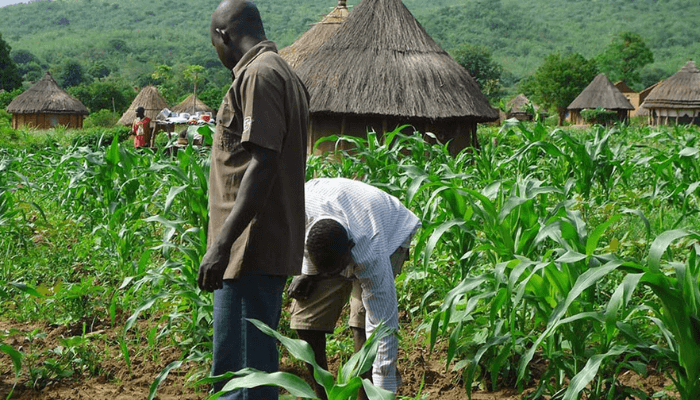Amid growing concern and controversy, food safety experts are now divided on Genetically Modified Organisms (GMO) foods.
While some are issuing warnings concerning the safety of GMO foods, others have declared them safe for consumption.
The groups against GMO foods are urging the federal government to adopt a total ban on its commercial use.
The disagreement comes amid multiple concerns, including what some describe as risks to public health, environmental hazards, threats to food security, and the impact of multinational seed corporations on Nigeria’s seed sovereignty.
GMO crops currently approved in Nigeria include Bt cowpea – a pest-resistant variety; TELA maize – a drought-tolerant and insect-resistant variety, and Bt cotton – a pest-resistant crop important to Nigeria’s textile industry.
However, months after their release into the market, the conversation surrounding GMOs continues to stir debate among the community of researchers, with some experts calling on the federal government to invest in organic, heirloom, and locally adapted crop varieties as alternatives.
However, proponents of GMO crops argue that their adoption would improve yields, increase farmers’ profitability, and address food insecurity.
Critics have joined the call for a critical evaluation of GMOs’ benefits and potential risks as part of Nigeria’s broader policy on food security.
According to the World Health Organisation (WHO), GMOs currently available on the international market have passed safety assessments and are not likely to risk human health or the environment.
In July 2024, the federal government allayed fears about GMO crops in Nigeria, insisting that they are safe and pose no harm to humans, animals, or the environment.
A coalition of Nigeria’s agricultural research bodies led by the Agricultural Research Council of Nigeria (ARCN) said there was no cause for alarm over the crops.
Backed by Nigeria’s Biosafety Act of 2015, two government officials, ARCN executive secretary Prof Garba Sharubutu and director-general of the National Biotechnology Research and Development Agency (NBRDA) Prof Abdullahi Mustapha, maintained that GM technology in Nigeria was developed after stringent safety assessments to improve crop productivity, resilience to climate change and other farming challenges.
Despite these assurances, opposition to GMO consumption remains strong among some stakeholders.
The House of Representatives recently called for a suspension of GMOs until a comprehensive investigation into potential health risks is completed.
Speaking to LEADERSHIP, Prof Qrisstuberg Amua, a prominent figure in biotechnology and a fellow at Hubei Bio-Tech, Wuhan, China, maintained a balanced yet cautious stance on GMOs, especially their use in food production.
Prof Amua, who is also the executive director of the Centre for Food Safety and Agricultural Research (CEFSAR), warned that with most GMO seeds patented by multinational corporations, Nigerian farmers would have to rely on these companies for seeds each season, potentially escalating costs, reducing farmers’ autonomy, and putting Nigeria’s food sovereignty at stake.
“CEFSAR emphasises that GMOs should only be introduced after thorough, independent scientific testing to ensure they are safe for human consumption and do not pose adverse health effects or environmental harm.
“GMO cultivation may impact biodiversity. CEFSAR advocates for practices that preserve Nigeria’s rich agricultural diversity,” Prof Amua told LEADERSHIP, adding that farmers and governments of other countries have previously used them and are now reversing their adoption and use because of resistance to pests (which also comes with a high collateral cost to human health).
He said GMOs might not entirely address the broader systemic issues.
Another expert, Prof Uche Amalu, a professor of agronomy from the University of Calabar, expressed concern over Nigeria’s adoption of GMOs. He warned that these could threaten the country’s agricultural sovereignty, environmental safety, and public health.
Prof Amalu stressed that Nigeria’s agricultural heritage remains threatened as foreign-produced seeds gain ground while urging the federal government to prioritise indigenous crops for food security.
He pointed out that many genetically modified seeds are not reusable, forcing farmers to purchase new seeds each planting season, which he described as exploitative.
Amalu recommended alternative solutions with roots in Nigeria’s agricultural history, such as enhancing indigenous crop varieties.
He urged the government to invest in research and development focused on improving traditional crops and supporting indigenous seed multiplication techniques, like those used with yam varieties, to bolster yield and resilience.
He said, “The federal government should beware of GMO foods and invest in our local seeds and seedlings to preserve our health and agricultural independence.
The only alternative is to find a way of reducing the intake of GMO foods, avoiding GMO seeds and seedlings, and going back to our indigenous crops”.
Meanwhile, Nigerian farmers appear increasingly supportive of GMO adoption.
President of the All Farmers Association of Nigeria (AFAN), Kabir Ibrahim, described GMOs as
“scientifically certified and safe for human consumption.”
Noting their potential to address critical food security challenges.
Ibrahim told LEADERSHIP that traditional, non-GMO alternatives remain widely available for farmers who prefer conventional crop options.
“GMOs have high-yield attributes, such as resistance to disease and drought, making them a game changer in our quest for sustainable food security. Nigeria’s food security drive requires an optimum push, which could come through GMO crops”, Ibrahim said.
The director of the Agricultural Biotechnology Department, National Biotechnology Development Agency
(NABDA), Dr Rose Maxwell Gidado, told LEADERSHIP that with the application of biotechnology in agriculture, farmers benefit from increased productivity or reduced costs.
She said GMO seeds increase yield, improve protection from insects and disease, and increase crops’ tolerance to heat, drought, and other environmental stress. She added that other benefits include improving the quality and content of animal feed, food, and energy sources.
Dr Gidado, who said consumer benefits are advantageous, added that GMO foods contain the needed nutrients, contrary to what some people are saying.“Eating GMO foods increased protein and healthier oils (Learn about Vistive Gold soybean oil),” she said, adding that the environmental benefits help reduce agriculture’s impact on the land.
“The GMO seeds conserve soil and energy, reduce greenhouse gases, minimise the use of toxic herbicides, conserve soil fertility and natural resources,” she said.On the benefits of GMOs to farmers, Dr Gidado said they increase productivity and reduce costs by increasing yield, improving protection from insects and disease, and increasing crops’ tolerance to heat, drought, and other environmental stress.





